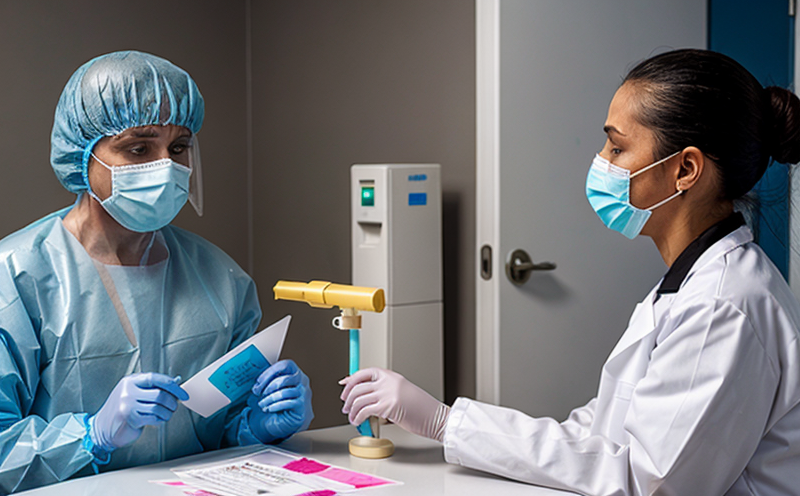Rift Valley Fever Virus Testing in Livestock
The Rift Valley fever virus (RVFV) is a zoonotic flavivirus that primarily affects livestock, particularly sheep, goats, cattle, and camels. In humans, it can cause severe illness, but its primary impact is on agricultural productivity and economic stability within affected regions.
RVFV testing in livestock is crucial for several reasons. It helps in early detection of the virus, which allows for quicker intervention to prevent further spread. This includes implementing biosecurity measures, culling infected animals, and vaccinating susceptible populations. Early diagnosis also aids in preventing outbreaks that could lead to significant economic losses.
The testing process involves collecting samples from livestock, typically blood or serum, which are then analyzed using various molecular techniques such as RT-PCR (Reverse Transcription Polymerase Chain Reaction). These tests can detect the presence of viral RNA, enabling precise identification and quantification of RVFV. Laboratories must adhere to strict protocols to ensure accurate results.
Accurate testing is essential for effective disease control strategies. Misdiagnosis or delayed diagnosis can exacerbate the situation, leading to broader outbreaks that are harder to contain. Therefore, laboratories specializing in this service play a critical role in supporting public health and agricultural policies aimed at mitigating RVFV.
The global standard for RVFV testing is ISO 15189:2012, which sets stringent requirements for quality management systems in clinical laboratories. Compliance with these standards ensures that the laboratory provides reliable and accurate test results. Additionally, adherence to guidelines such as those provided by WHO (World Health Organization) and CDC (Centers for Disease Control and Prevention) further enhances the reliability of the testing process.
In summary, Rift Valley Fever Virus Testing in Livestock is vital for controlling zoonotic diseases and protecting both animal health and human welfare. By providing accurate and timely test results, laboratories contribute significantly to public health initiatives and economic stability within affected regions.
Why It Matters
Rift Valley fever virus (RVFV) testing in livestock is not just a diagnostic tool but also a critical component of disease management strategies. The RVFV, which primarily affects domestic animals like sheep and goats, can have devastating effects on agricultural economies. Outbreaks can lead to significant financial losses due to increased mortality rates among livestock, reduced milk yields, and decreased meat production.
The economic impact extends beyond immediate animal health issues; it also encompasses broader societal costs such as food security concerns and potential trade disruptions. For instance, countries experiencing RVFV outbreaks often face restrictions on the export of live animals and animal products to unaffected regions, which can severely impact local economies reliant on livestock farming.
Early detection through rigorous testing is key to mitigating these risks. By identifying infected herds promptly, authorities can implement targeted measures such as culling, vaccination, and enhanced biosecurity protocols. These actions are essential for preventing the spread of RVFV within a country and between countries, thereby protecting both domestic animal populations and international trade.
The importance of accurate and rapid testing cannot be overstated. Delays in diagnosis can lead to unchecked viral transmission, resulting in larger outbreaks that are more difficult and expensive to control. Furthermore, timely intervention allows for the implementation of effective public health measures aimed at protecting human populations from RVFV exposure.
Given the global nature of agricultural trade and the interconnectedness of economies, controlling RVFV is a shared responsibility among nations. Laboratories that offer specialized testing services contribute to this collective effort by providing reliable data that informs national and international response strategies. Their role in ensuring accurate diagnosis is pivotal in maintaining public health standards and supporting sustainable agricultural practices.
Industry Applications
- Animal Health Monitoring: Regular testing helps identify infected herds early, allowing for targeted interventions to prevent further spread of the virus.
- Economic Stability: Preventing large-scale outbreaks reduces economic losses due to reduced productivity and potential trade restrictions.
- Sustainable Agriculture: By minimizing the impact of RVFV on livestock, testing supports long-term agricultural sustainability.
- Public Health Protection: Early detection ensures that public health measures can be implemented promptly to protect human populations from RVFV exposure.
Eurolab Advantages
At Eurolab, we pride ourselves on offering comprehensive Rift Valley Fever Virus Testing in Livestock services that meet the highest standards of accuracy and reliability. Our team of expert scientists and technicians ensures that every sample is processed with meticulous attention to detail, ensuring consistent and accurate results.
We employ state-of-the-art molecular detection methods, including RT-PCR, to identify RVFV RNA in livestock samples. This enables us to provide rapid and precise diagnostic information, which is crucial for effective disease management strategies. Our laboratories are accredited to ISO 15189:2012, ensuring that we meet the stringent quality requirements set by international standards.
Our commitment to excellence extends beyond just technical proficiency; we also prioritize customer service and timely reporting. We understand the importance of quick turnaround times in outbreak situations, which is why our laboratory processes are designed to minimize delays without compromising on accuracy or reliability.
In addition to our testing services, Eurolab offers a range of support services including training programs for local laboratories, guidance on best practices for sample collection and handling, and consultation on disease control strategies. We work closely with public health authorities and agricultural stakeholders to ensure that our services align with their objectives and needs.
Our success in providing reliable Rift Valley Fever Virus Testing in Livestock is a testament to our commitment to excellence and innovation. We are dedicated to supporting the global effort to control zoonotic diseases and protect both animal health and human welfare.





